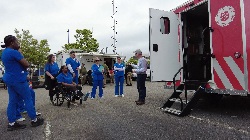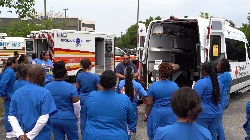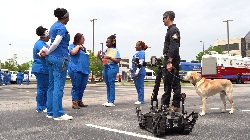 Healthcare professionals are among the first to respond during or after an emergency. Whether a community is dealing with a hurricane, wildfire, pandemic, or mass casualty event, healthcare skills will be valuable. Doctors, public health workers, nurses, physician assistants (PAs), and many other health professionals can help communities prepare for, respond to, and recover from disasters. All of these people are involved in keeping the public safe and supporting the healthcare system while it's under stress.
Healthcare professionals are among the first to respond during or after an emergency. Whether a community is dealing with a hurricane, wildfire, pandemic, or mass casualty event, healthcare skills will be valuable. Doctors, public health workers, nurses, physician assistants (PAs), and many other health professionals can help communities prepare for, respond to, and recover from disasters. All of these people are involved in keeping the public safe and supporting the healthcare system while it's under stress.
Preparing for Emergencies and Disasters
For many public health workers, disaster or emergency response is not their full-time focus. However, these events are something public health organizations often plan and prepare for. Public health workers1 may create response strategies and run or participate in simulations. As they plan and prepare, they may coordinate with hospital administration, healthcare staff, and government agencies. Their simulations often involve care providers such as nurses and PAs.
In areas where extreme weather events are common, both public health care workers and nurses may educate the community on how to prepare. Public health workers are also critical in tracking disease outbreaks. They may be the first to observe and report signs that a disease is on the rise.
Providing Information and Care During and After a Crisis
The Role of Nurses
Nurses2 are often vital to emergency medical care. They are trained to adapt quickly in high-pressure environments. Nurses may care for patients in overwhelmed hospitals, field clinics, and shelters. In disasters, they may triage patients by assessing injuries and deciding who needs care most urgently. They can manage wounds, provide medications, assist in surgeries, and more. Nurses can also help coordinate supplies, manage patient records, and direct their patients to useful community resources. Some nurses are even members of emergency response teams like the National Disaster Medical System or the American Red Cross.
 The Role of PAs
The Role of PAs
Physician assistants2 are another important type of care provider. PAs are especially useful when there aren’t enough doctors to meet the demand. PAs can diagnose conditions, create treatment plans, and perform many of the same duties as physicians. In emergencies, their versatility is a major asset. They may work alongside nurses and doctors providing a variety of services in the field and clinics.
The Role of Medical Assistants
Medical assistants2 offer crucial support in health emergencies. Their ability to step in and handle practical tasks keeps response teams moving. During disasters, they may take vital signs and document medical history, help set up mobile clinics or triage areas, organize supplies and patient paperwork, and help calm and direct patients. They’re often the ones keeping operations running in chaotic environments, especially when resources are limited.
The Role of Public Health Workers
Public health professionals help communities stay informed, safe, and organized. They track what’s going on, improve access to food, water, and other supplies, and share timely messages with the public. Public health teams may also help coordinate and support long-term recovery efforts and community resource programs.
Working Together to Help Impacted Communities
 As our Columbia campus students recently learned at their disaster response exercise, no one person responds to a disaster alone. Healthcare professionals may work alongside emergency managers, government agencies, and nonprofit organizations. Disaster response depends on collaboration. Many events also leave a lasting impact. Additional care providers in mental health, pharmacy, and physical therapy2 may continue to support the affected community. The teamwork and knowledge of everyone involved helps people survive and recover.
As our Columbia campus students recently learned at their disaster response exercise, no one person responds to a disaster alone. Healthcare professionals may work alongside emergency managers, government agencies, and nonprofit organizations. Disaster response depends on collaboration. Many events also leave a lasting impact. Additional care providers in mental health, pharmacy, and physical therapy2 may continue to support the affected community. The teamwork and knowledge of everyone involved helps people survive and recover.
If you’re interested in a career in healthcare and helping others, South University offers programs that can help you pursue your goals. Explore our programs or request information to speak with an admissions representative.
--
1South University does not promise or guarantee licensure, employment, or salary amounts.
2Graduates are required to pass the national certification exam and obtain a state license in order to work in the field. (Exam names vary by program.) Please refer to the State Professional Licensure Determination and National Certification/Licensure section of the University catalog for additional information. South University cannot guarantee each graduate will pass the required licensure examinations. South University does not promise or guarantee licensure, employment, or salary amounts.
Clinical/Medical programs have a required in-person clinical, practicum, or externship requirement. We cannot guarantee flexibility in these components of the program.




